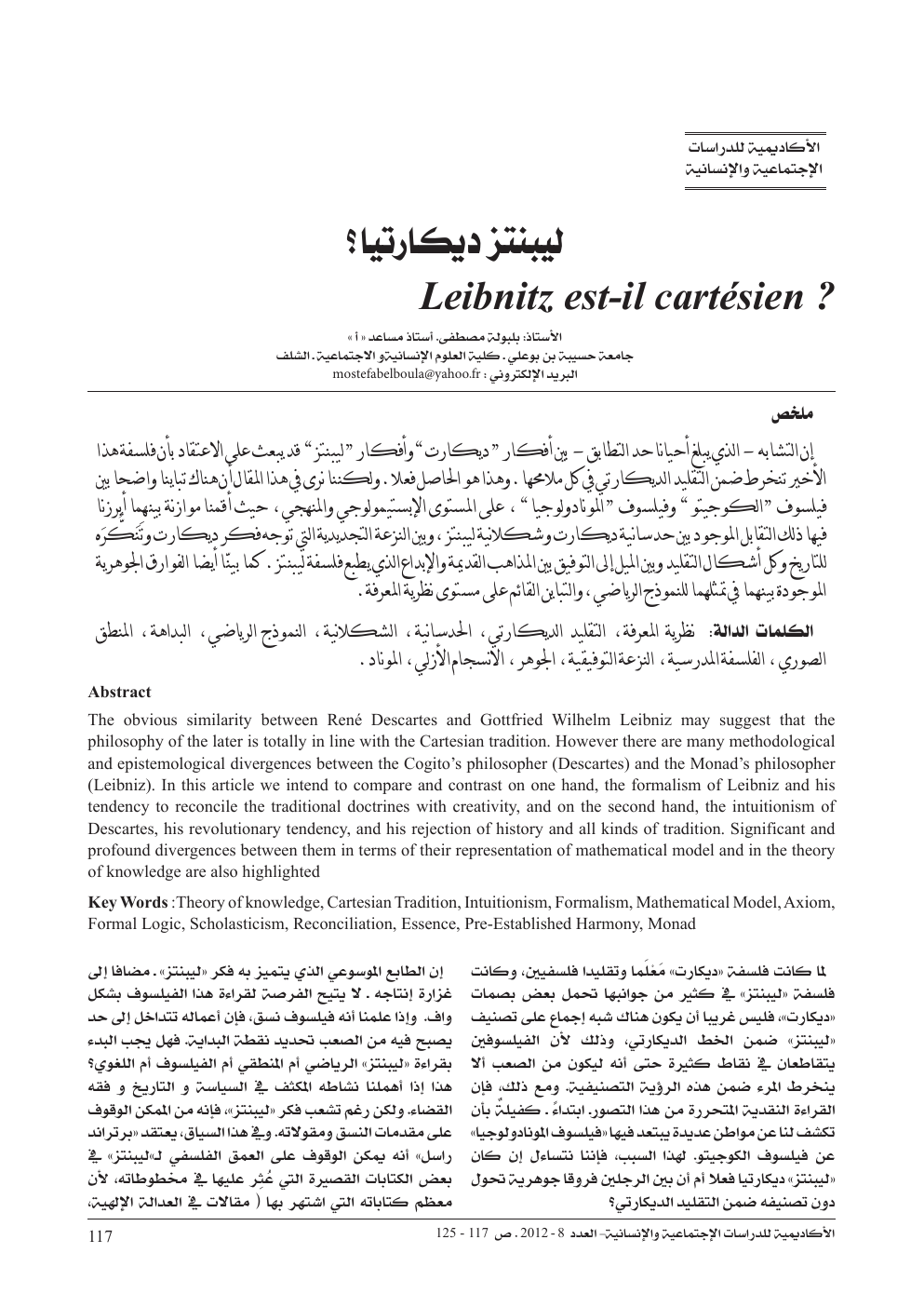Leibnitz est-il cartésien ?
Publié le 03/12/2022
Extrait du document
«
األكادميية للدراسات
اإلجتماعية واإلنسانية
ليبنتز ديكارتيا؟
? Leibnitz est-il cartésien
األستاذ :بلبولة مصطفى .أستاذ مساعد « أ »
جامعة حسيبة بن بوعلي ـ كلية العلوم اإلنسانيةو االجتماعية ـ الشلف
الربيد اإللكرتوني [email protected] :
ملخص
إن التشابه -الذي يبلغ أحيانا حد التطابق -بني أفكار “ديكارت”وأفكار “ليبنتز” قد يبعث على االعتقاد بأن فلسفة هذا
األخري تنخرط ضمن التقليد الديكارتي يف كل مالحمها.وهذا هو احلاصل فعال.ولكننا نرى يف هذا املقال أن هناك تباينا واضحا بني
فيلسوف “الكوجيتو” وفيلسوف “املونادولوجيا” ،على املستوى اإلبستيمولوجي واملنهجي ،حيث أقمنا موازنة بينهما أبرزنا
فيها ذلك التقابل املوجود بني حدسانية ديكارت وشكالنية ليبنتز،وبني النزعة التجديدية اليت توجه فكر ديكارت وتَن ُّ
َك َره
للتاريخ وكل أشكال التقليد وبني امليل إىل التوفيق بني املذاهب القدمية واإلبداع الذي يطبع فلسفة ليبنتز .كما بينّا أيضا الفوارق اجلوهرية
املوجودة بينهما يف متثلهما للنموذج الرياضي،والتباين القائم على مستوى نظرية املعرفة.
الكلمات الدالة :نظرية املعرفة ،التقليد الديكارتي ،احلدسانية ،الشكالنية ،النموذج الرياضي ،البداهة ،املنطق
الصوري ،الفلسفة املدرسية ،النزعة التوفيقية ،اجلوهر ،االنسجام األزلي ،املوناد.
Abstract
The obvious similarity between René Descartes and Gottfried Wilhelm Leibniz may suggest that the
philosophy of the later is totally in line with the Cartesian tradition.
However there are many methodological
and epistemological divergences between the Cogito’s philosopher (Descartes) and the Monad’s philosopher
(Leibniz).
In this article we intend to compare and contrast on one hand, the formalism of Leibniz and his
tendency to reconcile the traditional doctrines with creativity, and on the second hand, the intuitionism of
Descartes, his revolutionary tendency, and his rejection of....
»
↓↓↓ APERÇU DU DOCUMENT ↓↓↓
Liens utiles
- Quelles sont les présupposés et les conséquences du cogito cartésien ?
- « II y a dans toute erreur une part de vérité », écrit Leibnitz. Qu'en pensez-vous ?
- Texte de Hume : La critique du cogito cartésien
- ALAIN, Emile-Auguste Chartier, dit (1868-1951)Philosophe, il développe un humanisme cartésien, en accordant la suprématie aurôle de la raison sur l'affectivité : Système des Beaux-Arts, Propos sur lebonheur.
- Dissertation comparative entre le dualisme cartésien et le matérialisme naturaliste

































